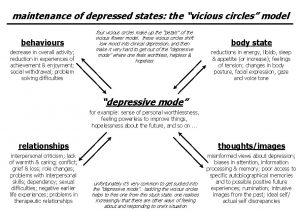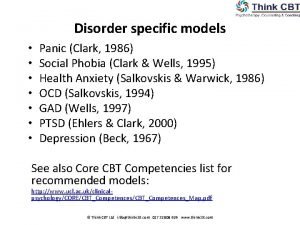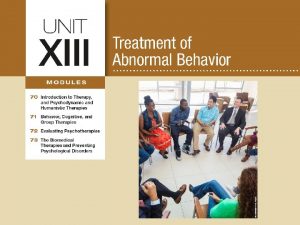maintenance of depressed states the vicious circles model


- Slides: 2

maintenance of depressed states: the “vicious circles” model behaviours decrease in overall activity; reduction in experiences of achievement & enjoyment; social withdrawal; problem solving difficulties four vicious circles make up the “petals” of the vicious flower model. these vicious circles shift low mood into clinical depression, and then make it very hard to get out of the “depressive mode” where one feels worthless, helpless & hopeless body state reductions in energy, libido, sleep & appetite (or increase); feelings of tension; changes in body posture, facial expression, gaze and voice tone “depressive mode” for example: sense of personal worthlessness, feeling powerless to improve things, hopelessness about the future, and so on. . . relationships thoughts/images interpersonal criticism; lack of warmth & caring; conflict; grief & loss; role changes; problems with interpersonal skills; dependency; sexual difficulties; negative earlier life experiences; problems in therapeutic relationships misinformed views about depression; biases in attention, information processing & memory; poor access to specific autobiographical memories and to possible positive future experiences; rumination; intrusive images from the past; ideal self/ actual self discrepancies unfortunately it’s very common to get sucked into the “depressive mode”. tackling the vicious circles helps to free one from this stuck state. one realises increasingly that there are other ways of feeling about and responding to one’s situation

other ways of feeling about and responding to our situation behaviours keeping an activity schedule; monitoring feelings of achievement & enjoyment; progressive building up of positive activities; identifying obstacles & problem areas; stimulus control & other ways of tackling sleep difficulties It can be very helpful when depressed to contrast two different ways of feeling about the situation. for example one might be a sense that “my problem is that I’m worthless, powerless to improve things, and the future is hopeless”. an alternative would be “my problem is that I keep getting these feelings that I’m worthless, powerless and the future is hopeless” “coping mode” body state pluses + minuses of exercise, clarifying fitness goals, working out a schedule; identifying & changing depressive body postures & facial expressions; relaxation methods; challenging bodily shame; light therapy; food; vitamins; herbs; medication therapy can help us change the way we feel about ourselves, our abilities and our choices relationships thoughts/images understanding importance of “social adjustment”; identifying changes wanted; building social networks; quality of relationship with partner; sexuality; changing toxic, over-critical interactions; grief work; role changes; pets; assertiveness; surviving abuse & poor parenting; optimal therapy understanding depression & therapy; combating rumination by mindful “unhooking”, redirecting attention & altering vulnerable situations; identifying intrusive/linked feelings, images & memories; emotional processing of this past material; clarifying personal priorities; challenging self-discrepancies; developing calmness & present focus ”therapy” involves challenging the stuck sense that the problem is actually my worthlessness, helplessness & hopelessness, understanding, active problem solving, shifting from rumination to external “task” focus, emotional processing of intrusive feelings, images & memories, mindfulness & appreciation, valued priorities



